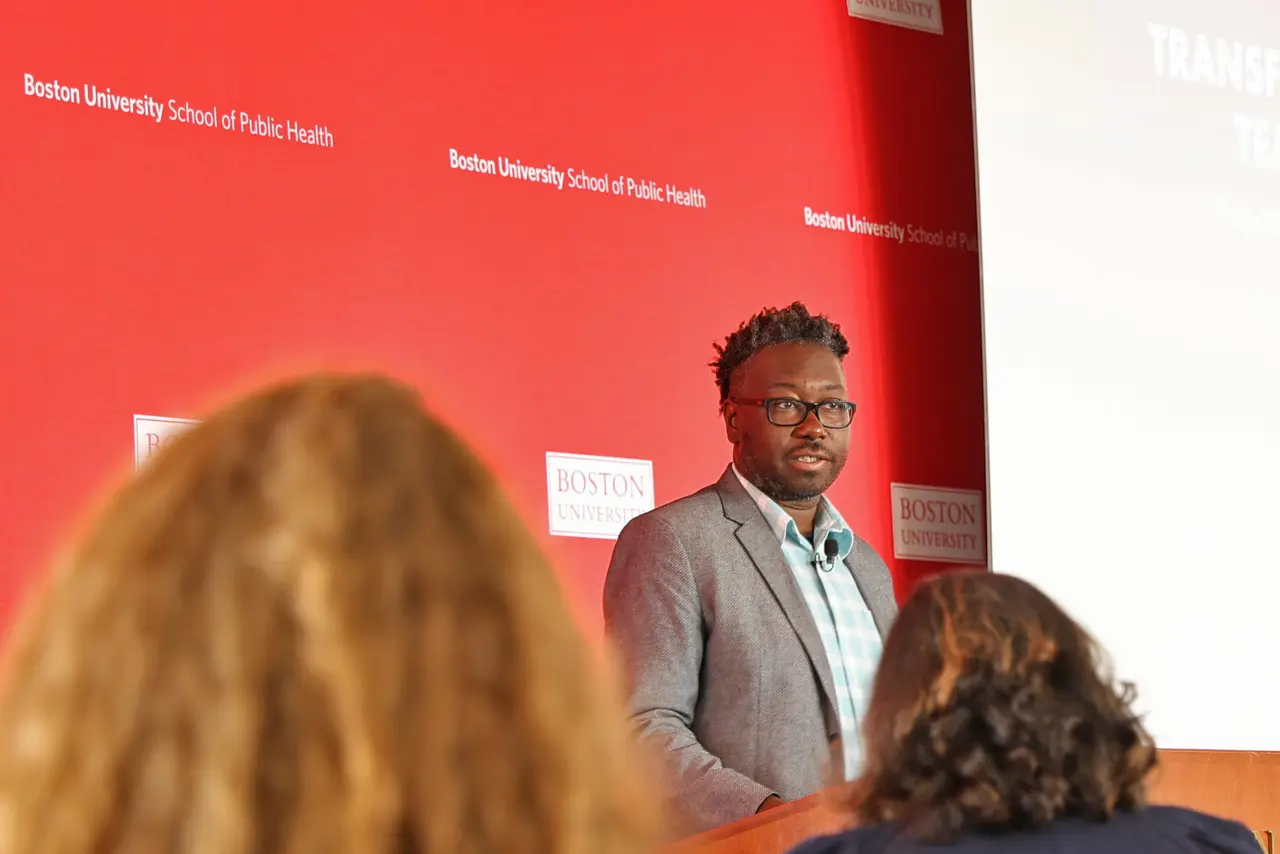Videos
Speakers

Tiffany N. Ford
Postdoctoral Fellow, Economic Studies, Brookings Institution; Incoming Assistant Professor (Fall 2023), Community Health Sciences, University of Illinois Chicago School of Public Health
Tiffany N. Ford, MPH, PhD conducts mixed methods well-being research that examines gendered racism in the health, economic, and social lives of Black people in the United States and considers how racism operates via policy, governance, and social norms to unequally distribute the things we need to be well. Ford earned her PhD in Policy Studies from the University of Maryland College Park, is an alum of the UIC School of Public Health Community Health Sciences division, and completed her undergraduate training at the University of Miami. Dr. Ford’s policy writing is informed by her power-building and sharing relationships with community-based organizations, community-led coalitions, and individuals most impacted by structural oppression. These ongoing connections inform her work which traverses the social and structural determinants of health and well-being and policy interventions to advance health equity at institutional, systems, local, and state levels.

Kushal Kadakia
M.D. Candidate, Harvard Medical School
Mr. Kadakia is an M.D. candidate at Harvard Medical School. Prior to medical school, he worked on delivery system transformation across the public (CMS, FDA, NC Medicaid), and private (Google Health, Cleveland Clinic London, Blue Cross NC) sectors. Kushal’s research has been published in journals such as NEJM and JAMA, and his writings on health care reform have been featured in outlets such as Harvard Business Review and STAT News. Originally from Houston, Texas, Kushal graduated summa cum laude from Duke University with degrees in biology and public policy as a Truman Scholar, and earned master’s degrees in epidemiology and history from the University of Oxford as a Rhodes Scholar.

Beth McGinty
Division Chief, Health Policy and Economics, Weill Cornell Medical College
Dr. Beth McGinty studies how health policies affect vulnerable populations with complex health and social needs, including people experiencing mental illness, substance use disorder, chronic pain, and others. Her work is characterized by integrating approaches from the fields of public policy, health economics, and implementation science to understand how policies affect population health. Dr. McGinty’s research has been funded by NIH, CDC, and foundations including the Commonwealth Fund and Arnold Ventures. She has served on multiple prominent advisory groups including a United Nations technical consultation panel on stigma reduction and drug use, a White House Task force on suicide prevention, and on the Joseph R. Biden campaign behavioral health committee.
Dr. McGinty holds a Master of Science from Columbia University and a doctorate in health and public policy from Johns Hopkins Bloomberg School of Public Health. Prior to joining Weill Cornell Medicine in 2022, she was a professor and the associate chair for research and practice in the Department of Health Policy and Management at the Johns Hopkins Bloomberg School of Public Health, as well as the director of the Johns Hopkins Center for Mental Health and Addiction Policy and the Johns Hopkins ALACRITY Center for Health and Longevity in Mental Illness.

Joshua M. Sharfstein
Vice Dean for Public Health Practice and Community Engagement; Director, Bloomberg American Health Initiative; Professor of the Practice in Health Policy and Management, Johns Hopkins Bloomberg School of Public Health
Dr. Sharfstein is Vice Dean for Public Health Practice and Community Engagement, director of the Bloomberg American Health Initiative, and Professor of the Practice in Health Policy and Management. Previously, he served as the Secretary of the Maryland Department of Health and Mental Hygiene, the Principal Deputy Commissioner of the U.S. Food and Drug Administration, as Commissioner of Health for Baltimore City, and as health policy advisor for Congressman Henry A. Waxman. He is an elected member of the National Academy of Medicine and the National Academy of Public Administration.

Kurt Stange
Director, Center for Community Health Integration; Distinguished University Professor, Case Western Reserve University
Kurt C. Stange, MD, PhD is a family and public health physician who serves as Director of the Center for Community Health Integration (CHI). In that role, he is working to quietly nurture research and development for community health and for integrated, personalized care, and to develop the capacity for shared learning for collective impact.
At Case Western Reserve University, he is a Distinguished University Professor and is the Dorothy Jones Weatherhead Professor of Medicine, and Professor of Family Medicine & Community Health, Population & Quantitative Health Sciences, Oncology, Sociology, and General Medical Sciences. For the Cleveland Clinical & Translational Science Collaborative he serves as a co-leader of the Community & Collaboration Shared Resource, and for the Case Comprehensive Cancer Center he is co-director of the Multimethod Cancer Outcomes Shared Resource.
With Rebecca Etz, PhD at Virginia Commonwealth University, he serves as co-director of the Larry A. Green Center for the Advancement of Primary Health Care for the Public Good. The Green Center is working to measure what matters in family medicine and primary care. He is an American Cancer Society Clinical Research Professor, editor for the Annals of Family Medicine and serves as chair-elect for the Board of OCHIN a not-for-profit health information and innovation network. At the Nova Institute for Health, he is a Scholar. He practices at Neighborhood Family Practice a federally-qualified community health center in Cleveland, Ohio.
He is working on Promoting Health Across Boundaries and is active in multimethod, participatory research and development that aims to understand and improve primary health care and community health. Recently he has been working to develop system science models that allow the complexity of primary health care and community health to be understood and acted upon. He has conducted many mixed methods quality improvement trials in health care, and research and demonstration projects at the interface between health care and community health. His research and development work has been funded by the National Institutes of Health, Agency for Health Care Research & Quality, Patient-Centered Outcomes Research Institute, Robert Wood Johnson Foundation, Cleveland Foundation, and others. He is a member of the Academy of Medicine of the US National Academy of Sciences.

Jamie Ducharme
Health Correspondent, Time
Jamie Ducharme is a correspondent at TIME magazine, where she covers health and science. Her work has won awards from the New York Press Club, the Deadline Club, and the Newswomen’s Club of New York. Previously, she was the health editor at Boston magazine. Her first book, Big Vape: The Incendiary Rise of Juul, was published by Henry Holt on May 25, 2021. It’s a deep-dive into the e-cigarette company Juul Labs and an exploration of the complicated search for an alternative to cigarettes.

Subscribe to PHC
Get the latest from Boston University School of Public Health



